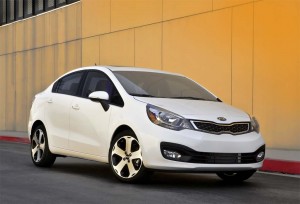In a crowded field, Kia has emerged as the fastest growing automotive brand in the United States with a combination of new products, clever marketing and growing owner loyalty that has satisfied customers coming back for more. The combination also suggests Kia is benefitting from a surge of favorable “world-of-mouth” endorsements over backyard fences and across driveways.
Using hip-hop hamsters to promote new products that have shifted from stodgy to stylish is clearly paying off for Kia, long lost in the shadows of its better-known Korean sibling Hyundai.
Kia’s dealer count has gone up modestly but sales per dealership have doubled since 2008 as the company’s aggressive product cadence has produced a series of well-designed vehicles such as the Soul, Forte, Forte Koup, Sorento, Sportage, Optima and now the subcompact Rio and Optima Hybrid.
The results have been an impressive sales surge. Kia announced best-ever September sales of 35,609 units, an 18.4% increase over the same period last year and the company’s 13th straight monthly sales record. For the year-to-date, Kia’s sales are up 37%, topping 365,000, boosting the company’s market share to 3.9%. The Korean automaker also expects to increase its 2011 market share for the 17th consecutive year, according to Tom Loveless, its vice president of sales.
Kia’s September sales were once again led by the Sorento, the maker’s first U.S -built vehicle. The Kia assembly plant in West Point, Ga. also added production of the 2012 Optima this fall.
Kia has been helped by a substantial increase in the residual value of its vehicles, which has move up from 37% three years ago to 55% currently. In addition, Kia has been cited for “lowest cost of ownership” by Kelly Blue Book.
“Customers are recognizing Kia vehicles as smart purchases and understand that you don’t have to sacrifice performance or styling in order to get impressive fuel efficiency or the latest technologies at a low starting price. As our residual values continue to outpace the industry, Kia’s value proposition is all the more powerful,” Michael Sprague, Kia Motor vice president of marketing and communications. Kia’s marketing effort also has made its mark.
Efforts to sell the Soul have been boosted by the acceptance of a distinctly unconventional advertising campaign, featuring a trio of hip-hop hamsters. The role of the rodent pitchmen has actually expanded since they were introduced in March, 2009 to help introduce Soul on television and across the web. Originally, the hamsters were scheduled to fade away. But they have developed a wide following that has led Kia to continue using them in new spots. The latest, a combination sci-fi and dance video, has become a major draw on YouTube.
In recognition of the public’s quick embrace of the campaign, the Madison Avenue Advertising Walk of Fame honored Kia’s hamsters recently with its first-ever “Rookie of the Year” award. The ads also have been honored as Nielsen’s “Automotive Ad of the Year” two years in a row and Silver and Gold Effie awards.
“In just two years the hamsters have become pop culture icons and driven record sales for the Soul and the Kia brand,” said Sprague, noting the ads have resonated with youthful consumers. “Kia’s demographics are changing,” he stressed, noting, “We’re attracting a younger consumer that’s more affluent and more educated.”
The hamsters were backed up last year by a successful and expanding partnership with the National Baketball Assocation, which enjoyed some of its highest ratings ever. The NBA currently is in lockout due to a labor dispute and Sprague said Kia is prepared for the possibility with contingency plans in place if part of the season is lost.
With the Rio, Kia expects to appeal to “maturing Millennials,” young buyers in the their late ’20s, who want the latest technology but also are very cost conscious and focused on their careers, Sprague said.
One of the big challenges for Kia has been finding a way to differentiate itself from Hyundai. Marketing has helped, but so has the decision to emphasize a distinctive styling theme — underscored by models like the Soul, Rio and Optima. Kia is also pushing to use technology as a brand identifier — and will be the first in the U.S. market to introduce a fuel-saving Start/Stop system on a mainstream model with the 2012 Rio.


